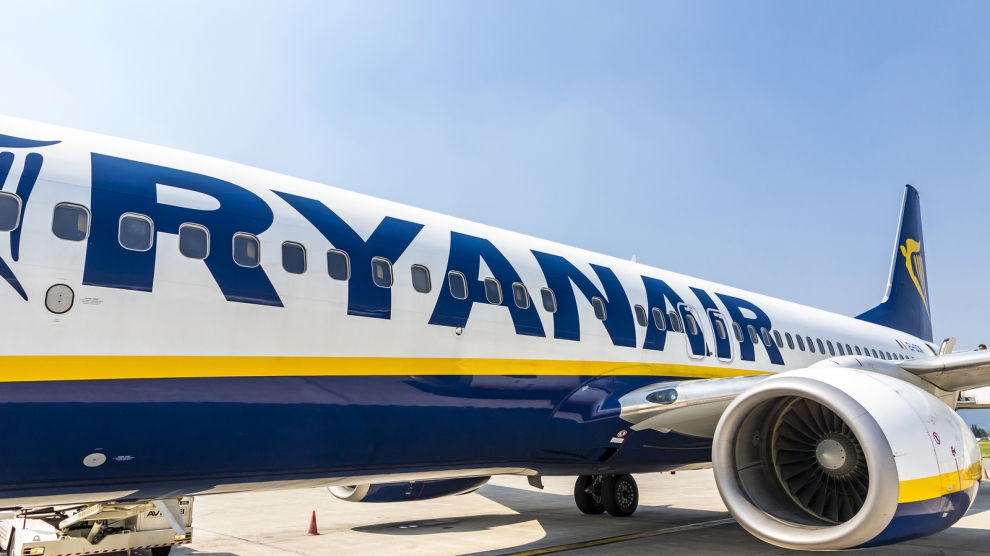EU airlines have been told to avoid Belarusian airspace while the national carrier of Belarus, Belavia, has been barred from accessing the bloc’s airports. Non-EU members Britain and Ukraine have taken similar action in response to what has been called the “state-sponsored” hijacking of a Ryanair flight from Athens to Vilnius.
The European Union has closed its airspace to planes from Belarus and has called on EU airlines not to fly over Belarusian airspace in response to the diversion of a Ryanair flight on May 23 that led to the arrest of a journalist, Roman Protasevich.
In a statement agreed at a meeting of the European Council in Brussels May 24, the EU’s 27 heads of state and government condemned the forced landing of Ryanair flight FR4978 in Minsk, and called for the immediate release of Protasevich and his Russian girlfriend, Sofia Sapega.
- Belarus accused of ‘hijacking’ Ryanair plane in order to arrest dissident journalist
- Belarus shuts down largest independent news portal, arrests staff
- How new anti-Nazi legislation in Belarus could be used to target civil society
As well as barring Belarusian airlines from the bloc’s airspace and airports EU leaders also called on the International Civil Aviation Organisation to launch an investigation. The UN body, which agrees standards for civil aviation, will meet on May 27.
Ursula von der Leyen, the European Commission president, said Belarus had used control of its airspace to perpetrate a “state hijacking”.
“This is an attack on democracy; this is an attack on freedom of expression; and this is an attack on European sovereignty. This outrageous behaviour needs a strong answer,” she said, adding that three billion euros of EU investment and economic support for Belarus will remain on hold until Belarus “turns democratic.”
‘Aviation piracy’
Earlier in the day, Ryanair boss Michael O’Leary called the affair a “state-sponsored hijacking” and an “act of aviation piracy”, while Willie Walsh, the director general of the International Air Transport Association and former CEO of British Airways’ parent company IAG, told CNN he couldn’t recall an incident like this in his career.
“We strongly condemn the actions of the government of Belarus in intercepting this flight and forcing it to land,” he told the network. “It clearly was an extremely dangerous action by the government. It put the crew of the Ryanair aircraft in a very difficult situation.”
Several EU airlines, including Lufthansa, airBaltic, SAS, Finnair and Wizz Air had already begun rerouting flights to avoid Belarusian airspace before the EU statement.
Two non-EU members, the UK and Ukraine, have also ordered their airlines to avoid Belarus.
Protasevich, who has lived in exile in Poland since 2019, was detained shortly after the Ryanair flight from Athens to Vilnius was diverted to Minsk shortly before leaving Belarusian airspace. The Belarusian authorities claim that they were forced to divert the plane due to a bomb threat from the Palestinian terrorist group Hamas.
Subsequent searches found no trace of explosives, however, and Hamas has denied the accusation.
‘Coercion’
Protasevich, a former editor of the highly influential Telegram channel Nexta, was wanted in Belarus for his role in organising last year’s protests against the country’s dictator, Alexander Lukashenko. Nexta was one of the key channels used by opposition protesters to mobilise support against Lukashenko.
In November, Belarus placed Protasevich on a terrorist watchlist and charged with three protest-related crimes.
The EU statement came shortly after the release of a video in which Protasevich denied reports he had suffered health problems since his arrest and said he was confessing to inciting mass riots, a charge that carries a maximum prison sentence of 15 years. The video, which appeared to have been filmed by Belarusian police, was Protasevich’s first appearance since his arrest.
His father, Dmitry Protasevich, told the BBC that the video seemed to be the result of coercion.
“It’s likely his nose is broken, because the shape of it has changed and there’s a lot of powder on it. All of the left side of his face has powder,” said Dmitry Protasevich, who also lives in exile in Poland.
Unlike many news and information platforms, Emerging Europe is free to read, and always will be. There is no paywall here. We are independent, not affiliated with nor representing any political party or business organisation. We want the very best for emerging Europe, nothing more, nothing less. Your support will help us continue to spread the word about this amazing region.
You can contribute here. Thank you.



